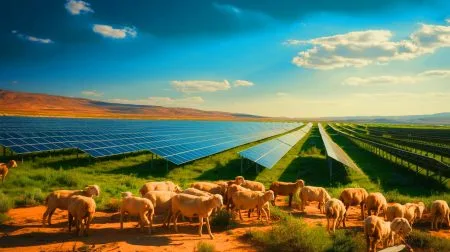| IN A NUTSHELL |
|
The recent report by the World Meteorological Organization (WMO) highlights a concerning trajectory for our planet’s climate. The possibility of exceeding the symbolic threshold of 1.5°C (2.7°F) of warming within the next five years is alarmingly high. This projection, covering the period from 2025 to 2029, underscores the urgent need for global action. As we delve deeper into the implications of this report, it becomes clear that the climate challenges we face are not only imminent but also increasingly severe. What does this mean for our future, and how can we respond effectively?
Understanding the 1.5°C Threshold
The significance of the 1.5°C (2.7°F) warming threshold cannot be overstated. According to the WMO report, the years 2023 and 2024 were the hottest on record globally. This warming is measured against a baseline from the pre-industrial era, specifically 1850-1900, a time before widespread industrialization. This period marks a time when humans had not yet begun burning fossil fuels on an industrial scale, which emits greenhouse gases that are the primary drivers of climate change.
The 1.5°C target was set optimistically by many nations in the 2015 Paris Agreement. However, as the years have passed, it has become increasingly clear that achieving this goal is challenging. The primary reason is the continued increase in CO2 emissions. Despite global awareness and agreements, emissions have not decreased as needed. Instead, they have continued to rise, casting doubt on our ability to limit warming effectively.
The WMO report now suggests a 70% chance that the 1.5°C threshold will be exceeded by the late 2020s or early 2030s. This prediction is a stark reminder of the urgency of addressing climate change and highlights the need for immediate action to mitigate its impacts.
The Possibility of 2°C Warming
The WMO report offers a sobering outlook on the potential for even greater warming. It highlights a 1% chance that at least one of the next five years could see a temperature increase exceeding 2°C (3.6°F). This is a significant development, as it is the first time scientists have considered this possibility in their relatively short-term forecasts.
While this probability may seem small, it represents a significant shift in climate science projections. Just a decade ago, the idea of surpassing the 1.5°C threshold was considered a distant concern. However, in 2024, this threshold was temporarily breached. Although this does not violate the Paris Agreement, which focuses on long-term averages, the trend suggests that permanent exceedance of this threshold is likely in the coming decades.
Climate models, such as those from the European Copernicus program, estimate that the current average warming from 2015 to 2034 is about 1.44°C (2.59°F) above pre-industrial levels. This proximity to the 1.5°C mark indicates that further exceedances are imminent, and 2024 may have been a precursor to what we can expect in the next decade.
Implications of Increased Warming
The potential for increased global warming carries significant implications for the planet. Each fraction of a degree of warming brings more intense heatwaves, droughts, extreme rainfall, and the accelerated melting of polar ice. These changes have far-reaching consequences for ecosystems, economies, and human health.
The reliance on fossil fuels like oil, gas, and coal continues to be a major barrier to reducing emissions. The WMO report criticizes this continued dependence, labeling it as an absolute folly. Despite advances in renewable energy technologies, the transition away from fossil fuels has been slow, driven by economic and political interests.
As climate change intensifies, vulnerable communities are particularly at risk. The impacts of increased warming are disproportionately felt by those with the fewest resources to adapt. Addressing these disparities is essential in global climate strategies to ensure a just and equitable transition to a more sustainable future.
Steps Toward a Sustainable Future
In light of these predictions, it is clear that urgent action is required to curb emissions and mitigate climate change. Policymakers, businesses, and individuals must work together to implement solutions that reduce reliance on fossil fuels and promote sustainable practices. Investing in renewable energy, improving energy efficiency, and protecting natural carbon sinks such as forests are critical steps in this process.
International cooperation remains vital. Climate change knows no borders, and global challenges require global solutions. The Paris Agreement laid the groundwork for such cooperation, but more ambitious commitments and follow-through are needed to meet the challenges ahead.
As we confront these climate challenges, we must ask ourselves: how can we accelerate the transition to a sustainable future, and what role can each of us play in making this vision a reality?
Did you like it? 4.6/5 (23)







Does anyone else feel like we’ve been hearing “urgent action” for years now? When will it actually happen? 🤔
OMG, I can’t believe we might surpass 1.5°C by 2030! Time to move to Mars? 😂
Can we really trust the data from the World Meteorological Organization?
Every degree counts, and it’s scary to think about the implications of 2°C warming. Thanks for highlighting this.
Great article, but how feasible is it to reduce reliance on fossil fuels in such a short time?
Is there any hope left, or are we doomed? 😟
What role do renewable energy sources play in this scenario?
The Paris Agreement seems more like a suggestion than a binding commitment. Thoughts?
Can someone explain how we measure these temperature changes? 🤷♂️
Spelling mistake on “metorological” in the third paragraph. Just a heads-up!
Time to invest in air conditioning stocks, I guess! 😅
Thank you for using AI to enhance the article. It’s a great read!
How are developing countries supposed to keep up with these climate demands?
Why is there still so much political resistance to renewable energy?
Ah, the usual “code red” scare tactics. Nothing new here.
What are the main obstacles to reducing CO2 emissions globally?
I appreciate the focus on vulnerable communities. Climate justice is vital! 🙌
Is nuclear energy a viable alternative to fossil fuels?
This is terrifying. Thank you for sharing such a crucial article. We need to wake up!
Can we not just plant more trees to offset the emissions?
Thanks for this insightful piece. We need more awareness and action!
Hasn’t the Earth gone through warming periods before? What’s different now?
Love the emojis in the article! They help illustrate the points well. 😊
The report sounds dire, but where’s the plan for action?
Gotta love the “absolute folly” line. Who’s responsible for this mess? 😤
Any good news in this report, or is it all doom and gloom?
Why is nobody talking about the role of livestock farming in CO2 emissions? 🐄
What can individuals do to contribute to reducing emissions?
I’m skeptical. How accurate have these climate predictions been historically?